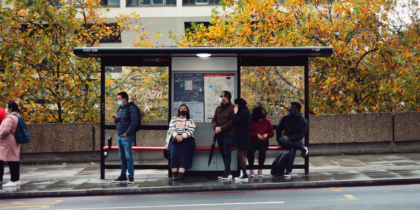Hartlepool is a coastal town where fishing was the main industry. It is the smallest of the local authorities to receive Better Mental Health Fund resources, with a population of 93,663, of which 4.5% are from racialised communities.
It ranks 21st on the Index of Multiple Deprivation, with a fifth of households experiencing deprivation and relatively high numbers of people with long-term conditions. Hartlepool is in the top 15% for food insecurity and was particularly vulnerable to the pandemic. This reflected the prevalence of chronic illness and rising health inequalities, and the Covid-19 death rate has been 27% higher than the rest of England.
The Covid-19 Health Inequalities Impact Assessment for the North East highlighted that Hartlepool is ranked 12th nationally in a list of areas where recovery from Covid-19 is likely to be hardest. This highlighted the impact of Covid-19 on Hartlepool in terms of mental health, the wider determinants, workforce and services.
For information about health needs and community assets in Hartlepool, see the Tees JSNA.
Identifying the focus of Better Mental Health Fund
The projects reflected needs that had previously been identified and were amplified by the pandemic, notably isolation, low emotional wellbeing and fears about coming out of Covid, and the need for support with grief and bereavement. The death by suicide of a young person from a town in the North East of England during the first lockdown highlighted the importance of raising awareness about suicide and its effects on the school and the wider community.
A ‘Working Together’ consultation event brought together a wide range of key partner agencies, people with lived experience and family carers to explore what was working well, and not so well, and to develop a local action plan. Many of the priorities identified informed the development of the Better Mental Health Fund in Hartlepool.
How was the Better Mental Health Fund used?
The Better Mental Health Fund was welcomed as it enabled the local authority to address priorities that had been identified to support Covid recovery. There were nine projects:
- Wellbeing community navigators for women, lone mothers and people who have lost their jobs, with a single point of access to community navigators. The navigators worked with individuals to identify issues (for example, financial insecurity) and develop plans to address them
- Development of a peer-led support network aimed at young men, including a drop-in session and various social activities
- Bereavement counselling and peer support provided for all ages
- Emotional wellbeing interventions for children and young people, targeted at those from racialised communities and those with existing mental health problems.
- Mindfulness for adults living alone, and those with mental health problems, caring responsibilities, or physical health conditions.
- Suicide prevention and self-harm training for teachers: development of a town-wide strategy, which includes rolling out training to build capacity in school staff and increase the number of staff who can lead the intervention.
- Better mental health for vulnerable parents: planned activities included a ‘Pregnancy, Birth and Beyond’ antenatal group and the ‘Being a Parent’ peer-led parenting programme
- Two mental health literacy programmes, one targeted at employees and the other a universal initiative linked to Making Every Contact Count – an approach adopted by health and care staff to engage people in conversations about their health and how to address risk factors. The Better Mental Health Fund has enabled this to be extended to include mental health.
Most of the activities were led by local authority staff, apart from the bereavement counselling and peer support project provided by a local hospice, which has a specialist centre.
Supporting young men to better mental health
A Wellbeing Officer works with young men between the ages of 18-35 who have experienced significant personal challenges – including grief, loneliness, and pressures associated with studying – which have left them isolated and, on occasion, struggling to cope.
Dissatisfied with NHS mental health services and the support offered by voluntary sector projects that focused on the needs of older adults, the men come together weekly to share their experiences, build confidence in talking about their emotions, and share ideas about how to get by, day by day.
There is a core of six attendees who are the backbone of the group; other men attend intermittently.
The connections they have made are strong. The men help each other manage depression and anxiety which has restored feelings of belonging and purpose. For some participants, having supportive friends and a stable source of support are new experiences and a source of considerable nourishment. One participant described the other attendees as ‘friends for life’. Increases in self-worth, confidence and purpose were evident, with some of the men going on to voluntary work or employment.
The success of the group is a source of pride for the facilitator and the participants alike. It is hoped that resources will be found to keep it going.
What have we learnt?
The programme benefitted from an up-to-date needs assessment that provided a strong foundation for investment in prevention and supported their plans to build a town-wide strategy for suicide prevention.
Relatively modest investment in voluntary and community organisations can result in positive mental health outcomes and help build the sector.
Sustainability of projects is an issue. It was considered in the project design and several of the projects aim to build capacity, for example, through training for schools and mental health literacy. There are plans to continue with the wellbeing community navigators, although these are not mental health specific. Nonetheless, sustainability is a challenge for some of the projects, particularly the peer support network for young men.



